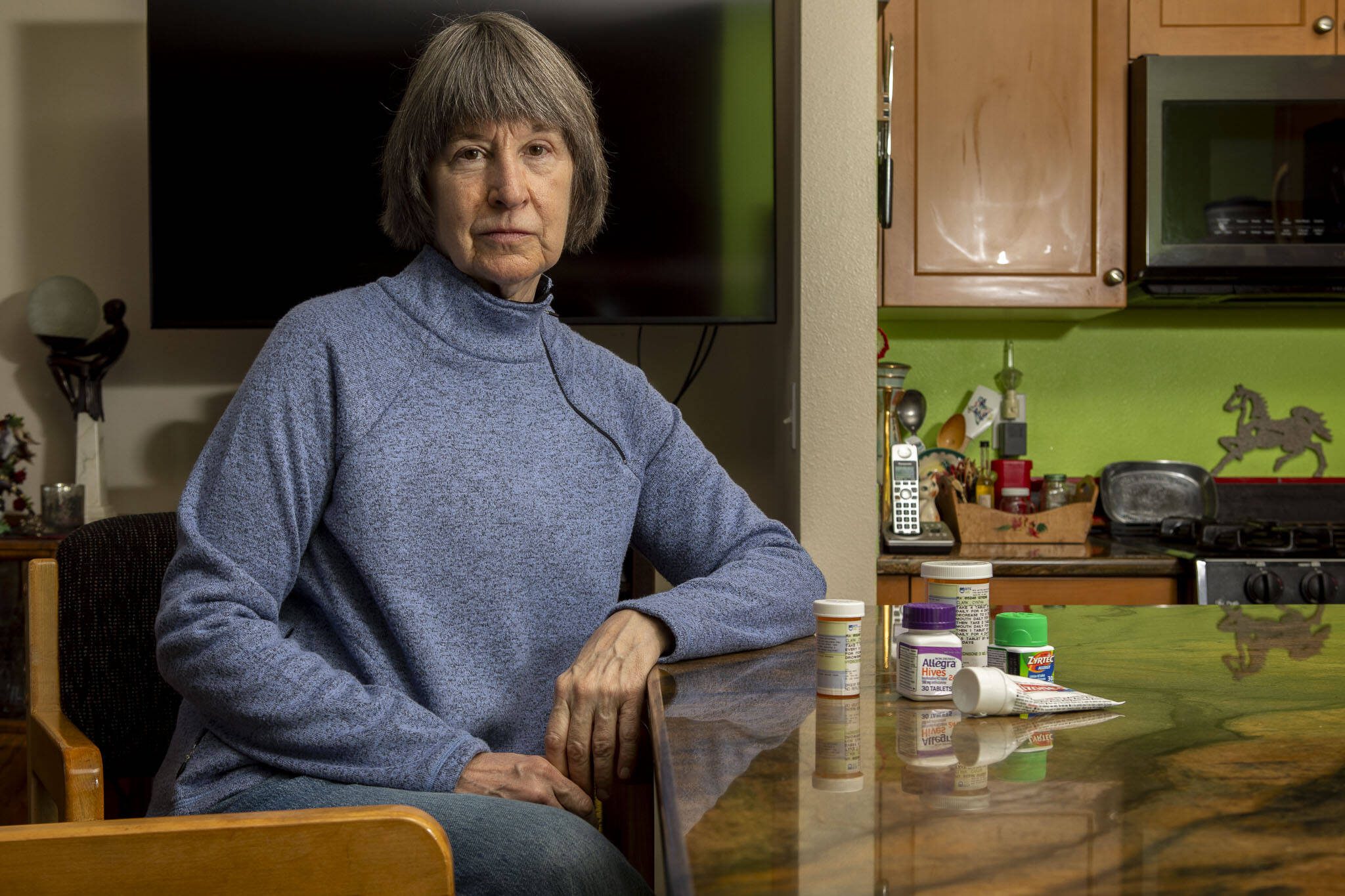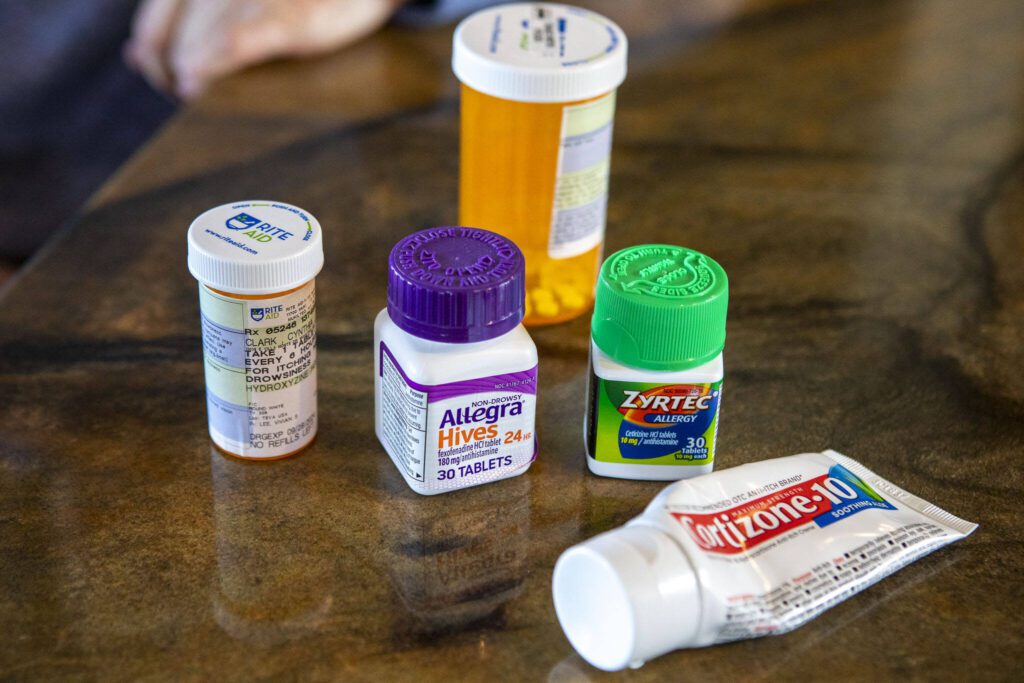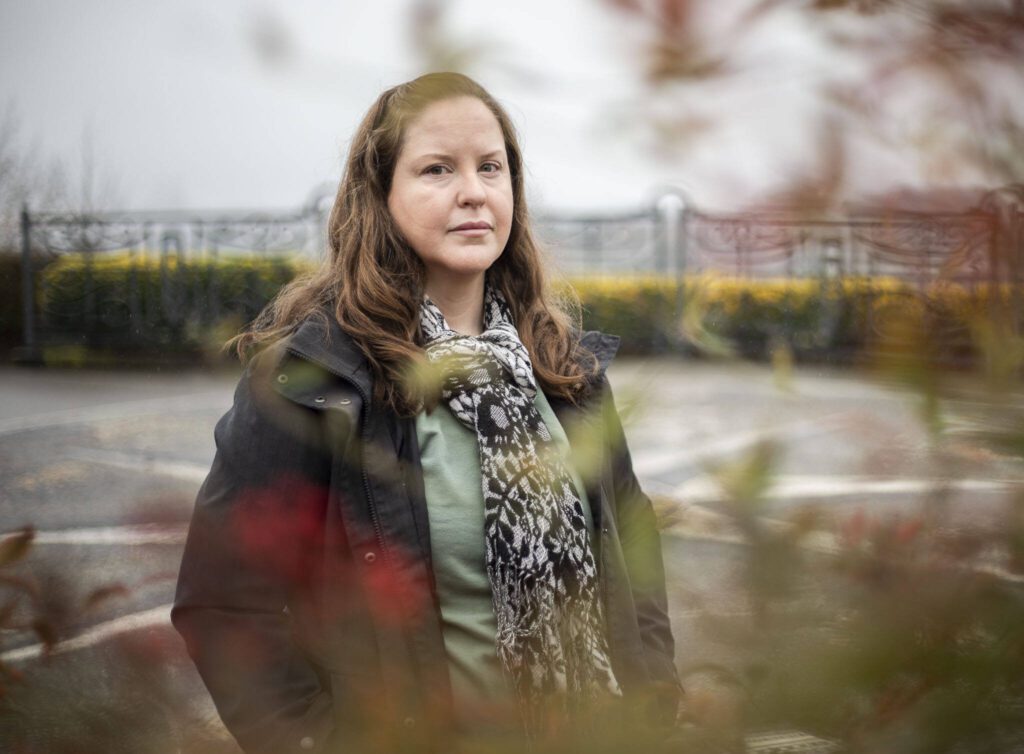SNOHOMISH — Amy McGrath thought she had a mild case of COVID. Over a year later, she’s fighting for her life.
In August 2022, McGrath, 41, and two of her family members caught the virus for the first time. They had typical symptoms — fatigue, body aches, a scratchy throat.
McGrath tested at a walk-in clinic and a doctor prescribed her Paxlovid, an antiviral pill the Food and Drug Administration had approved that May to treat COVID. It became the National Institute of Health’s recommended COVID treatment after a clinical trial showed an 89% reduction in the risk of hospitalization and death in people who were unvaccinated.
At the clinic, McGrath’s vitals showed high blood pressure and a fast heart rate. The doctor told McGrath to keep an eye on it, she said.
She went to her home in Snohomish to recover.
Three weeks later, McGrath was still exhausted. Her blood pressure remained high. Her heart rate was faster than normal. She had dizzy spells after standing up, bending or crouching. She also had a big flare-up of lupus, an autoimmune disease that attacks body tissues and organs. Viral infections can trigger the symptoms.
“I thought, ‘This will go away in a couple of months, I’ll be fine,’” she said. “I had taken Paxlovid. I got vaccinated. I thought I had done all the right things.”
By October, McGrath’s condition had declined further. She visited her primary care doctor, who diagnosed her with Post-COVID Syndrome, commonly known as Long COVID.
COVID patients have reported long-term symptoms since spring 2020. The condition became an official disability through The Americans with Disabilities Act in July 2021.
‘It’s not just in my head’
Yuan-Po Tu, disease and outbreak response director at Optum Pacific Northwest, said the medical field’s understanding of Long COVID is still “very poor.”
“We cannot predict who will have it, their symptoms or how long they’ll be affected,” he said.
People who may be at higher risk for Long COVID include women, seniors, those who are unvaccinated or who have underlying conditions.
Since tests can’t diagnose Long COVID, providers often use a “diagnosis of exclusion” to determine the syndrome, Tu said. Symptoms must follow a COVID infection and last at least 30 days. Providers look at a patient’s medical history and perform a physical exam to exclude other causes. The symptoms vary from mild, such as loss of smell, to severe, such as heart failure.
After her diagnosis, McGrath’s blood pressure continued to increase and she developed Stage 2 hypertension. Just over a month after starting medication for her blood pressure, McGrath experienced intense chest pain and heart flutters. She went to the emergency department.
“They were like, ‘Oh, you’re fine,’” McGrath said.
McGrath had premature ventricular contractions, or an irregular heartbeat. A doctor told her the condition was common and she was likely just feeling anxious, she said.
“I told them, ‘I have Long COVID’,” McGrath said. “’It’s not just in my head. There’s something going on.’”
Heart rhythm disorders, or cardiac arrhythmia, are common in Long COVID patients, according to a study published last year. Having Long COVID more than doubles a person’s risk of new cardiac symptoms.
McGrath sought others who had post-COVID symptoms and felt unheard.
“I turned to TikTok of all places,” she said.
@amyree724 #heartfailure #survival #pacingtherapy #pacemaker #cardiology #medical #gaslighting #heart #journey #oddsofsurvival #chronicillness #disability #spoonie #lupus #longhauler #foryou #trending #study #followme #vaccine #contrast #echo #mri #organ #dysautonomia #disabled #spooniesoftiktok #longcovidawareness ♬ 【No drums】 Emotional space-like epic … – MoppySound
She began sharing her story and is now part of a Long COVID community of patients, advocates and doctors on the app.
“I’ve been able to connect with people around the world,” she said. “That has really empowered me to be a self advocate.”
‘Be my own doctor’
Long COVID has perplexed doctors and scientists.
It has more than 200 possible symptoms. The prevalence of COVID cases with long-term effects is “challenging to estimate,” according to the Centers for Disease Control and Prevention, with estimates ranging from 5% to 30%. Doctors have suspected Long COVID is more likely after severe illness, but a global study published in the American Medical Association in 2022 showed it may be more common after mild cases.
“They don’t know this beast very well,” Cindy Clark said.
Clark, 66, of Mukilteo, and her husband, Carl, 71, were on a bus tour for senior citizens when they contracted COVID for the first time.
“The whole bus came down with it,” she said. “The symptoms were pretty classic. Fever, fatigue. I did some coughing.”
That was in September of last year. Four months later, Clark was still dealing with an unexpected aftereffect: hives.
“The hives were terrible,” she said. “In my hair, on my feet, on my ears, trunk and down on my arms and legs. And behind my knees.”
The hives began a few days after Clark’s COVID symptoms improved. She had hives before — about three times in her life — but never this bad. And the medication she used wasn’t working.
“Altogether, I spent probably over $100 on antihistamines,” she said.
Eventually, Clark’s doctor prescribed her a steroid and antihistamine cocktail that slowly improved the painful symptoms. Clark asked if the outbreak could be related to her COVID infection, but her doctor dismissed the idea, she said.
That’s when she got a second opinion from what she calls “Dr. Google.”
“I’ve been looking at a lot of stuff on the internet,” she said. “Hives is an immune response. It’s your body trying to fight something off that’s attacking it.”
Many, like McGrath and Clark, have turned to the internet to understand their post-COVID symptoms. Long COVID may be the first illness discovered through patients finding one another on Twitter, according to an article published in Social Science and Medicine in 2021. The Washington State Hospital Association lists 11 post-COVID online support groups on its website. Survivors created the Long COVID Alliance, a coalition of more than 1,500 organizations and people nationwide.
“It’s helped me to be my own doctor,” McGrath said. “If I can speak the same language as the doctors and do my own research, I can go into an appointment feeling like I can get better results.”
‘It took six months’
Long COVID patients can face a disconnect among their providers. Often, specialists can only treat one symptom of the condition. And each doctor may have a different understanding of the illness.
McGrath spent months going from specialist to specialist, with no one able to look at the whole picture.
“I usually have to wait about one month to see a cardiologist,” she said. “It took me three months to see a rheumatologist this last year. It took six months to see a pulmonologist.”
Dr. Julie Hodapp knows the research for Long COVID is incomplete, and patients are waiting months to see a specialist. But she’s optimistic about Long COVID care.
In 2020, Hodapp helped open the state’s first post-COVID recovery clinic at Harborview Medical Center in Seattle. Initially, the clinic had no guidance, a small staff and a huge wave of referrals.
“We’ve been learning about symptoms and trying to figure out treatment at the same time,” she said. “A lot of the doctors across the country have come together. In the next year or so, there will be more information.”
This past September, Hodapp’s clinic was one of nine Long COVID clinics across the United States to receive a $1 million federal grant. The clinic is using some of the money to develop Long COVID training for doctors across the region. Aside from the clinic at Harborview, there are few virtual post-COVID clinics in Washington.
Long COVID guidelines for detection and treatment are now in medical journals, Hodapp said. There’s also new research — scientists have discovered a connection between Long COVID and gut health, for example. Prebiotics and probiotics could help with symptoms such as fatigue.
The National Institutes of Health has launched several Long COVID studies as part of its $1 billion RECOVER initiative. Hodapp’s clinic, along with other health care services in the Pacific Northwest, joined the study. Patients can sign up to participate.
‘Killing you over time’
A cardiologist eventually diagnosed McGrath with supraventricular tachycardia, a condition that causes a person’s heart rate to rapidly increase to high levels. During these episodes, McGrath’s heart rate jumped as high as 220 beats per minute. A normal rate is 60 to 100 beats per minute.
“Many people feel like they’re having a heart attack,” she said. “That was something I never experienced prior to COVID.”
An echocardiogram showed McGrath’s heart was too swollen and weak to pump enough blood to the rest of her body.
“That’s how I went from COVID to heart failure,” she said.
After months of heavy medication, tests showed McGrath’s condition in decline. She got a pacemaker in September. Two leads, or wires, shock her heart to stay in rhythm, and a third acts as a defibrillator in case of a heart attack. As of this month, she was on five heart medications.
“I’m starting to feel like myself again,” she said. “I don’t have the dizziness, brain fog, fatigue.”
McGrath has another test next month. If the pacemaker hasn’t improved her condition by then, she will go on a heart transplant list.
“After all the months I spent researching heart failure, that was the one thing I didn’t look at — if there was a chance a pacemaker couldn’t work,” she said. “That was a tough reality, thinking that you got a virus and it’s killing you over time. And doctors may not be able to save you.”
‘People don’t understand’
In the United States, about 20 million adults have had Long COVID and more than 5,000 have died from post-COVID symptoms since 2020, according to the CDC.
“People don’t understand how serious this can be,” McGrath said.
In Snohomish County, it’s difficult to “meaningfully surveil” Long COVID cases, county Health Officer James Lewis said. The county is focused on bringing awareness to the syndrome to educate providers and encourage vaccination. A shot can help prevent Long COVID, according to a National Institutes of Health study.
“Some people in the medical community think this is not a real disease,” Lewis said.
That’s partly why it’s important to get tested at a clinic so there is a record of infection, McGrath said. She also advised to track symptoms and take vitals regularly.
After a year of being sick, McGrath has a Long COVID assessment scheduled with her primary care doctor this month.
“If you develop a mysterious illness and you’ve had COVID in the last year, it could be from COVID,” she said. “People are not connecting the dots.”
Sydney Jackson: 425-339-3430; sydney.jackson@heraldnet.com; Twitter: @_sydneyajackson.
Talk to us
> Give us your news tips.
> Send us a letter to the editor.
> More Herald contact information.



























